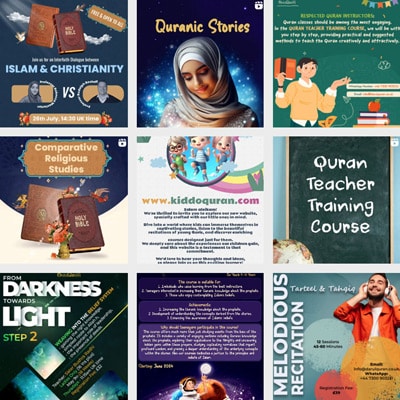Don’t regard the action’s speed but follow the good performance of a task, for people don’t ask how long it does take but rather they ask about its quality.
Ali ibn Abi Talib (a)
Table of Contents
ToggleTajwid is the set of rules that govern the pronunciation of the Holy Quran. It ensures correct delivery, respect, and beauty in reciting the holy verses.
Importance of Tajwid in Quranic Recitation
Enhanced Understanding
One of the key reasons why Tajwid is important in Quranic recitation is that it helps in preserving the exact pronunciation of the words and verses of the Grand Quran. The Arabic language is known for its intricacies and subtle nuances, and mastering the correct pronunciation of each letter and sound is crucial for accurately conveying the message of Quran.
By following the rules of Tajwid, reciters can avoid distortions or misinterpretations of the text, thereby ensuring the integrity and authenticity of the Quranic recitation.
Furthermore, Tajwid serves as a means of enhancing the beauty and eloquence of Quranic recitation. The Sacred Quran is not just a book of guidance; it is also a literary masterpiece filled with profound meanings, poetic imagery, and rhetorical devices.
By applying the principles of Tajwid, reciters can bring out the melodious and rhythmic qualities of the Holy Quran, making the recitation a spiritually uplifting experience for both the reciter and the listener.
The proper intonation, rhythm, and emphasis on certain words and phrases can evoke emotions and deepen the impact of the Quranic verses on the hearts and minds of believers.
Moreover, Tajwid helps in improving the comprehension and understanding of the Quranic text. The correct pronunciation and articulation of the words aid in deciphering the meanings and nuances of the verses, enabling readers to grasp the intended message and derive deeper insights from the text.
By paying attention to the details of Tajwid, individuals can develop a greater appreciation for the linguistic richness and complexity of Quran, leading to a more profound understanding of its spiritual, moral, and ethical teachings.
In addition, the practice of Tajwid fosters discipline, patience, and dedication in individuals who strive to perfect their Quranic recitation. Mastering the rules and techniques of Tajwid requires constant practice, perseverance, and self-discipline, as even minor errors in pronunciation or intonation can affect the overall recitation.
By devoting time and effort to honing their recitation skills, individuals can cultivate a sense of humility, reverence, and devotion towards Sacred Quran, making their spiritual journey more meaningful and rewarding.
Spiritual Connection
Spiritual connection is a fundamental aspect of Tajwid in Quranic recitation. The correct pronunciation and intonation of the Arabic text is believed to enhance the spiritual experience of reciting Quran.
By paying attention to the rules of Tajwid, one can create a more powerful connection with the words of Allah and feel their impact on the soul. Reciting with proper Tajwid can elevate the reciter’s spiritual experience, helping them to connect more deeply with the divine message of the Grand Quran.
Furthermore, Tajwid is important in Quranic recitation because it helps to convey the intended meanings of the text more effectively. The Holy Quran is a book of guidance and wisdom, and proper recitation is essential to fully understand and appreciate its teachings.
By reciting with Tajwid, one can ensure that they are accurately conveying the meanings and messages of the Quran.
This allows the reciter to have a deeper understanding of the text and gain spiritual insights that may have been missed without proper pronunciation and intonation.
In addition, Tajwid in Quranic recitation is a way to honor and respect the sacredness of Quran. As the literal word of Allah, the Glorious Quran is held in the highest regard by Muslims, and reciting it with Tajwid is a way to show reverence for its divine origins.
By reciting with proper pronunciation and intonation, one demonstrates their respect for the sacred text and acknowledges the importance of preserving its accuracy and authenticity.
Tajwid in Quranic recitation is also important for fostering a sense of discipline and focus during the recitation process. Following the rules of Tajwid requires concentration and attention to detail, which can help to create a meditative and contemplative state of mind.
By reciting with Tajwid, one can cultivate a sense of mindfulness and presence, allowing them to fully immerse themselves in the spiritual experience of reciting Quran.
Preservation
One of the key reasons why Tajwid is so crucial in Quranic recitation is its role in preserving the authenticity of Quran.
The Noble Quran is the word of Allah, revealed to humanity through the Angel Gabriel to the Prophet Muhammad over a period of 23 years.
It is considered the ultimate source of guidance for Muslims, containing teachings on faith, morality, ethics, law, and spirituality.
Therefore, it is of utmost importance that the Grand Quran is recited in the exact same manner in which it was revealed, without any changes or deviations.
The rules of Tajwid help ensure that the Holy Quran is recited precisely as it was revealed, with the correct pronunciation of each letter, the proper lengthening or shortening of vowels, and the appropriate stops and pauses.
By adhering to these rules, reciters can avoid misinterpreting or misrepresenting the text of the Noble Quran, thus preserving its original meaning and message.
Furthermore, Tajwid also plays a vital role in preserving the soundness of Quranic text. The Sacred Quran was revealed in the Arabic language, which has a rich and complex phonetic system.
The correct pronunciation of each letter and vowel is essential for conveying the meaning of the text accurately.
Without proper Tajwid, reciters may unintentionally change the meaning of the Quranic verses, leading to misunderstandings and misinterpretations.
In addition to preserving the authenticity and soundness of Quranic text, Tajwid also enhances the spiritual experience of reciting Quran. The beauty and rhythm of proper Quranic recitation can have a profound impact on the hearts and minds of believers, invoking feelings of awe, reverence, and tranquility.
By reciting Quran with proper Tajwid, Muslims can deepen their connection to the divine message and strengthen their faith.

Engaging Activities for Learning Tajwid Rules
Immersive and interactive activities can make learning Tajwid enjoyable and effective for adults. Let’s explore engaging methods to master Tajwid rules.
Group Sessions
First and foremost, group sessions provide students with the opportunity to learn from their peers. By being in a group setting, students can benefit from the different perspectives and experiences of their classmates.
This can lead to a deeper understanding of the material and provide students with new insights into the Tajwid rules. Additionally, group sessions allow students to ask questions and engage in discussions with their peers, which can further enhance their learning experience.
Group sessions also provide students with a sense of community and support. Learning can be a challenging and sometimes overwhelming process, especially when it comes to mastering something as complex as Tajwid rules.
By being part of a group, students can lean on each other for support and encouragement.
This sense of community can help students stay motivated and engaged in their studies, ultimately leading to better retention of the material.
Furthermore, group sessions can be a fun and interactive way to learn Tajwid rules. By incorporating games, activities, and discussions into the sessions, students can stay engaged and interested in the material.
For example, a group session could include a game where students have to recite a verse from the Quran while following the Tajwid rules. This not only reinforces the material but also makes learning enjoyable and memorable.
Memory Games
Memory games provide a structured and interactive way to practice and reinforce Tajwid rules.
By turning the learning process into a game, individuals are more likely to stay motivated and engaged throughout the learning process.
This can help prevent boredom and frustration, which are common barriers to effective learning.
Additionally, the competitive nature of memory games can make learning Tajwid rules more enjoyable and rewarding, leading to increased motivation and effort.
Furthermore, memory games can help to improve concentration and focus, which are essential for mastering Tajwid rules.
The cognitive skills required to play memory games, such as attention to detail, pattern recognition, and spatial awareness, are also important for learning and applying Tajwid rules correctly.
By practicing these skills through memory games, individuals can improve their ability to focus and concentrate when reciting Quran, leading to a more accurate and beautiful recitation.
Role-Playing
One of the main reasons why role-playing is a great activity for learning Tajwid rules is that it allows students to actively engage with the material.
Instead of passively listening to a lecture or reading through a textbook, students are actively participating in the learning process. This hands-on approach helps students to better internalize and remember the rules they are learning.
By physically embodying the rules through role-playing, students are able to make deeper connections to the material and retain the information better.
Additionally, role-playing can help students to better understand the practical application of Tajwid rules. Instead of just memorising the rules, they can see how these rules are applied in real-life scenarios.
For example, students can role-play a scenario where they are reciting a passage from the Sacred Quran and must apply the correct Tajwid rules.
This not only helps them to better understand the rules but also to develop the necessary skills to apply them effectively.
Furthermore, role-playing can make learning Tajwid rules more enjoyable and engaging for students. Instead of just listening to a teacher lecture about the rules, students get to actively participate in the learning process.
This can make the material more interesting and exciting, leading to increased motivation and engagement. When students are engaged in their learning, they are more likely to retain the information and apply it effectively.
Role-playing can also help students to develop important skills such as communication, collaboration, and problem-solving.
By working together to act out scenarios, students can practice their communication and collaboration skills. Additionally, they may encounter challenges or obstacles during the role-play that require them to think critically and problem-solve in order to overcome them. These skills are not only valuable for learning Tajwid rules but also for overall academic and personal development.

Group Recitation Exercises
Group recitation sessions enable participants to practice Tajwid collectively, receive feedback, and build camaraderie. Let’s dive into effective group exercises.
Choral Recitation
Through choral recitation, individuals can correct their mistakes, improve their pronunciation, and enhance their overall understanding of Quran.
One of the primary benefits of choral recitation is the opportunity for individuals to receive feedback from their peers. When reciting verses in a group setting, others can listen and provide constructive criticism on areas where improvements can be made.
This feedback is invaluable in helping individuals to identify and correct their mistakes, ultimately leading to a more accurate and beautiful recitation of Quran.
Furthermore, choral recitation allows individuals to learn from one another. By reciting verses together, individuals can observe how others pronounce certain words or phrases and incorporate these techniques into their own recitation.
This collaborative learning environment fosters growth and improvement among all participants, as they work together to enhance their recitation skills.
Additionally, choral recitation helps to build a sense of community among individuals. Coming together to recite verses from Quran fosters a sense of unity and solidarity among participants, creating a supportive and encouraging environment for learning.
This sense of camaraderie can be particularly beneficial for individuals who may feel hesitant or nervous about reciting alone, as they can draw strength and confidence from their peers.
Moreover, choral recitation allows individuals to practice listening skills, as they must pay attention to the recitation of others in order to coordinate their own recitation.
This practice helps individuals to develop a keen ear for correct pronunciation and intonation, ultimately leading to a more polished and accurate recitation.
Pass-the-Ayah
Pass-the-Ayah is a group recitation session where each participant recites a verse (ayah) of Quran, and then passes it on to the next person in the group.
This enables each participant to practice their own recitation skills, while also listening to and learning from the recitation of others.
One of the primary benefits of Pass-the-Ayah as a group recitation practice is that it provides a supportive and encouraging environment for individuals to practice Tajwid.
By reciting in a group setting, participants can receive feedback and guidance from others, allowing them to improve their recitation skills and correct any mistakes in real-time.
Additionally, Pass-the-Ayah helps to build a sense of community and unity among participants. Reciting the Noble Quran together creates a sense of shared purpose and collective worship, fostering a bond among individuals who are striving to improve their understanding and practice of the Quran.
Furthermore, Pass-the-Ayah is an effective way to enhance listening skills and develop a deeper appreciation for the beauty and significance of Quranic recitation.
By listening to the recitation of others, participants can learn from different styles and techniques, as well as gain a greater understanding of the meanings and teachings of Quran.
Peer Correction
Peer correction is a powerful tool for improvement in any discipline, and when it comes to the recitation of the Sacred Quran with proper Tajwid, it can be especially beneficial.
In a group recitation session focused on practicing Tajwid, allowing peers to correct each other can enhance the learning experience for everyone involved. Peer correction can foster a sense of camaraderie and mutual support among participants.
By working together to improve their Tajwid skills, individuals in the group can form strong bonds and create a positive learning environment. This collaborative spirit can motivate participants to practice more diligently and strive for excellence in their recitation.

Individual Practice Techniques
Developing individual Tajwid skills enhances personal connection with the Quran’s teachings. Let’s uncover effective individual practice methods.
Recitation Reflection
Recitation reflection is a powerful activity that can help individuals develop their Tajwid skills. Tajwid is the science of proper pronunciation and recitation of the Noble Quran, and it is an essential skill for any Muslim who wants to recite the holy book accurately and beautifully. Recitation reflection involves listening to and reflecting on one’s own recitation of the Glorious Quran in order to identify and correct any mistakes or shortcomings.
One of the key benefits of recitation reflection is that it allows individuals to become more aware of their own recitation habits and tendencies.
By listening to their own recitation, individuals can pinpoint areas where they may be making mistakes in terms of pronunciation, intonation, or rhythm.
This self-awareness is crucial for improving one’s Tajwid skills, as it allows individuals to focus on specific areas for improvement and actively work to correct them.
Recitation reflection also helps individuals develop a deeper connection with the Holy Quran. By taking the time to listen to their own recitation, individuals can better internalize the words and message of Quran.
This reflection can lead to a greater sense of spiritual fulfillment and connection with the text, as individuals become more attuned to the meanings and emotions conveyed in their recitation.
Furthermore, recitation reflection can help individuals build confidence in their recitation abilities.
By actively listening to and analyzing their own recitation, individuals can track their progress over time and see tangible improvements in their Tajwid skills. This progress can boost individuals’ confidence and motivation to continue working on their recitation, ultimately leading to even greater improvement in their skills.
To engage in recitation reflection, individuals can follow a few simple steps. First, they should record their own recitation of a passage from the Noble Quran using a smartphone or recording device. Next, they should listen to the recording carefully, paying attention to their pronunciation, rhythm, and overall delivery.
They can then make note of any mistakes or areas for improvement, and practice those specific areas to enhance their Tajwid skills.
Audio Feedback
Audio feedback provides immediate and accurate guidance on pronunciation, intonation, and rhythm while reciting the Sacred Quran. By listening to their own recitations and receiving feedback from teachers or peers, individuals can identify areas for improvement and make necessary adjustments.
This process not only helps in correcting mistakes but also enhances memorization and understanding of the Quranic text.
Furthermore, audio feedback allows for personalized learning experiences tailored to individual needs and learning styles. It promotes self-reflection and self-correction, leading to continuous improvement in Tajwid skills.
Self-Correction Tools
Self-correction tools, such as recording devices or apps, can be valuable resources for those seeking to improve their recitation. By listening to their own recitation, individuals can pinpoint areas for improvement and work towards perfecting their pronunciation, rhythm, and overall delivery.
One method of using self-correction tools is to record oneself reciting a passage from Quran and then listen back to the recording. This allows individuals to hear their own mistakes and areas where they may be struggling.
By identifying these errors, individuals can make the necessary corrections and work towards a more precise and melodious recitation.
Another way to utilize self-correction tools is through apps that provide real-time feedback on recitation. These apps can highlight areas where individuals may be missing proper pronunciation or where they may be lacking in fluency.
By receiving instant feedback, individuals can adjust their recitation in the moment and improve their skills with each repetition.
In addition to aiding in individual self-correction, these tools can also be used in group settings to facilitate peer feedback and support.
By sharing recordings with fellow students or teachers, individuals can receive constructive criticism and guidance on how to enhance their recitation.
This collaborative approach can lead to a more comprehensive understanding of Tajwid and a stronger sense of community among learners.
In conclusion teaching Tajwid to adults can be made engaging and effective through the use of interactive activities technology and multimedia elements.
By incorporating these elements into the curriculum educators can help learners develop a deep understanding of Tajwid and improve their Quranic recitation skills.
You can explore Tajwid and adult courses with interactive activities visit DarulQuran for more information.

















